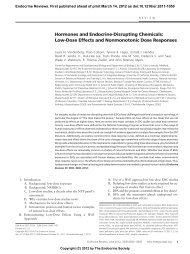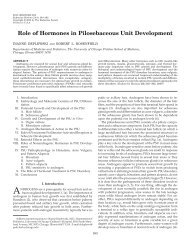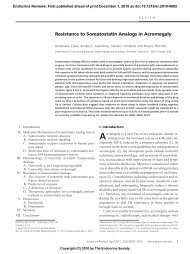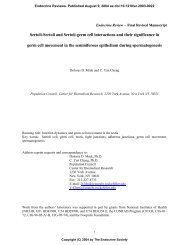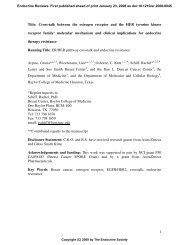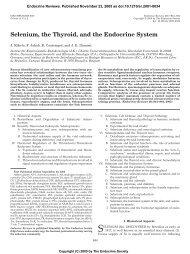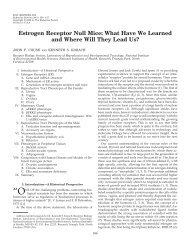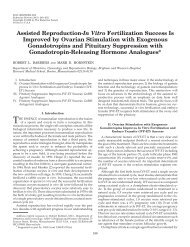1 BETA-CELL FAILURE IN DIABETES AND PRESERVATION BY ...
1 BETA-CELL FAILURE IN DIABETES AND PRESERVATION BY ...
1 BETA-CELL FAILURE IN DIABETES AND PRESERVATION BY ...
Create successful ePaper yourself
Turn your PDF publications into a flip-book with our unique Google optimized e-Paper software.
53<br />
Concerning the potential mediators of the therapeutic effects of DPP-IV inhibition,<br />
Nauck and El-Ouaghlidi (218) presented 5 arguments suggesting that GLP-1 is not the only<br />
– or at least not the major – mediator of the glucose-lowering actions of DPP-IV inhibition<br />
observed in clinical studies (219, 220, 215): DPP-IV inhibition - 1. causes little increase in<br />
circulating endogenous GLP-; 2. has little effect on gastric emptying; 3. does not cause<br />
nausea/vomiting as do GLP-1 and incretin mimetics; 4. meal-stimulated GLP-1 fall and 5.<br />
has delayed effects on glucose homeostasis (218). In the same issue of Diabetologia, Holst<br />
and Deacon acknowledge these arguments, but maintain that current evidence nonetheless<br />
supports the dominant role of GLP-1 (221).<br />
Table 5 summarizes the overlapping and distinct properties of GLP-1R agonists vs.<br />
DPP-IV inhibitors for the treatment of DM 2 (222):<br />
Table 5. GLP-1 Receptor agonists versus DPP-IV inhibitors<br />
Ahrén (214) has suggested that neuropeptides, biologically active peptides localized<br />
to islet nerve terminals and functioning as neurotransmitters, may be substrates for DPP-<br />
IV (213), thus contributing to the actions of DPP-IV inhibitors in diabetes. Neuropeptides<br />
that are stored in islet nerve terminals and affect islet function would be of particular<br />
relevance in this regard, and the islet autonomic nervous system could be an important<br />
regulator of islet function (223). One neuropeptide of potential importance is pituitary<br />
adenylate cyclase–activating peptide (PACAP), which is localized to islet nerves and has<br />
several actions relevant to glucose homeostasis (224). Since PACAP is also a substrate for<br />
DPP-IV, it could contribute to the therapeutic benefits of DPP-IV inhibition recently shown<br />
in mice whereby PACAP-induced insulin secretion increased following inhibition of DPP-<br />
IV by valine pyrrolidide (225).<br />
The potential risks associated with DPP-IV inhibitors include the prolongation of<br />
the action of other peptide hormones, neuropeptides, growth factors, cytokines and<br />
chemokines cleaved by the protease (213) along with their interaction with DPP-IV-related<br />
proteases. Moreover, DPP-IV has effects beyond its proteolytic action, including T-cell



